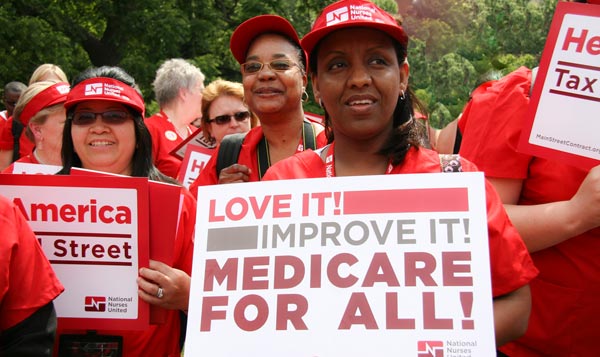

Share
Saying the House’s ruling Republicans want to throw people out of health care coverage, union leaders turned thumbs down on the Republican plan unveiled earlier this week.
So, significantly, did some key Senate Republicans, but for different reasons. Enough Senators raised doubts about the GOP’s scheme to endanger passage in there, where the GOP holds only 52 of 100 seats, with Democrats holding 46, and pro-Democratic independents two.
The Republican plan would repeal many key features of the Affordable Care Act, including provisions that expand Medicaid coverage, establish health exchanges and prevent insurer discrimination against women.
It would keep coverage of adult children on their parents’ plans until age 26 and ban insurers from denying coverage or ejecting people due to pre-existing conditions. But it would also let insurers charge older plan-holders even more than the ACA allows: Five times the “normal” amount, rather than three.
AFL-CIO President Richard Trumka called the GOP scheme “haphazard” and would hurt millions of people who have gained health care coverage since the ACA was enacted seven years ago.
The GOP’s plan “would result in painful taxes on working families, cuts to Medicaid, and tax giveaways for the super-rich. Of all the bad ideas in this flawed plan, forcing workers to pay a so-called ‘Cadillac tax’ on employer provided health care has to be among the worst,” said Trumka.
“The reality is, this isn’t a healthcare plan at all,” Trumka continued. “It’s a massive transfer of wealth from working people to Wall Street. Making care less affordable and accessible” is “bad for healthcare, it’s bad for working families, it’s bad for our economy and we will fully oppose it,” Trumka added.
Jean Ross, RN, co-president of National Nurses United, called the GOP plan – and Trump’s backing for it – a betrayal of Trump’s campaign trail promises of “far less expensive and far better” health care than under the ACA.
“While there are legitimate criticisms of the ACA, notably the 28 million (people) who remain without health coverage, and the law’s failure to rein in escalating out-of-pocket costs for millions more, the Republican alternative is far worse,” Ross added. She reiterated NNU’s stand that Medicare for All – single-payer government-run health insurance nationwide – could fix ACA’s problems.
“The Republican plan moves us back, far back, to the worst vestiges of a profit-focused system based on ability to pay and widespread health disparities,” said Ross.
American Federation of Government Employees President J. David Cox called the GOP plan “a cruel retraction of coverage that will end up depriving millions of Americans coverage they have come to rely on.
“This new plan does not improve the Affordable Care Act. It cuts taxes for the wealthy, and makes healthcare unaffordable – and thus inaccessible – to millions who obtained coverage on the exchanges or through Medicaid expansion,” he said.
Federal workers, whom his union represents, are familiar with the ACA’s problems because that law was modeled on the plan the feds use, Cox said. And both are expensive and don’t cover everyone because both “put private health insurers in the driver’s seat.” AFGE supports single payer national health insurance, built on the platform of expanding Medicare.
The GOP plan kills minimum covered health benefits – the ones insurers must now pay for, no questions asked – such as for women’s prenatal health care. It also removes funds for Planned Parenthood, which often is the sole health provider for poor women.
Service Employees International Union President Mary Kay Henry focused on the corporate interests pushing ACA repeal and the GOP plan. “Self-interested politicians at both ends of Pennsylvania Avenue and their corporate backers are continuing to push an extreme agenda that put profits ahead of the health of working Americans,” she said. SEIU represents hundreds of thousands of health care workers.
“For Congress and the administration to promise more affordable health care, greater financial security, and the ability to drive our own health care decisions while putting forward a piecemeal health care proposal is an insult to working people who are fed up with an economic and political system that’s rigged against them.”

